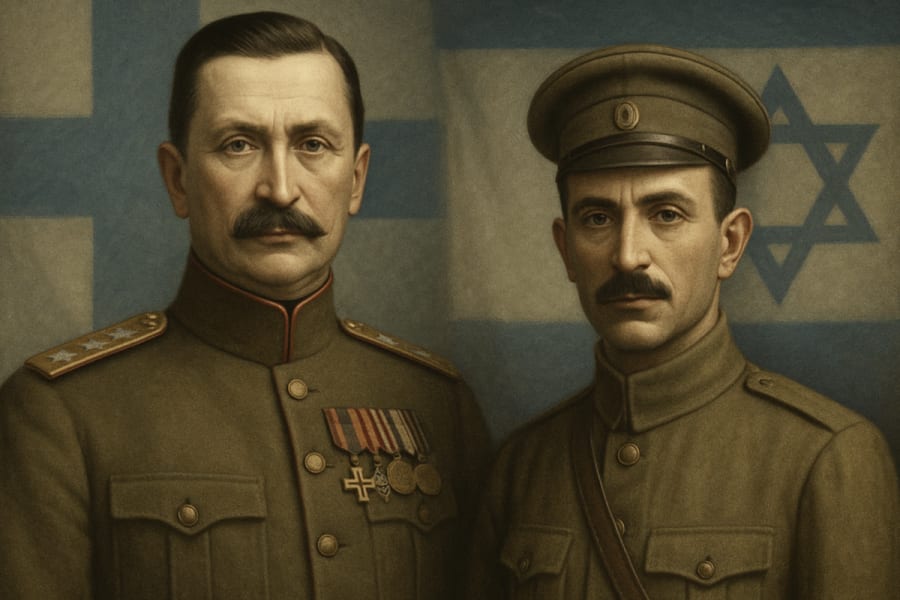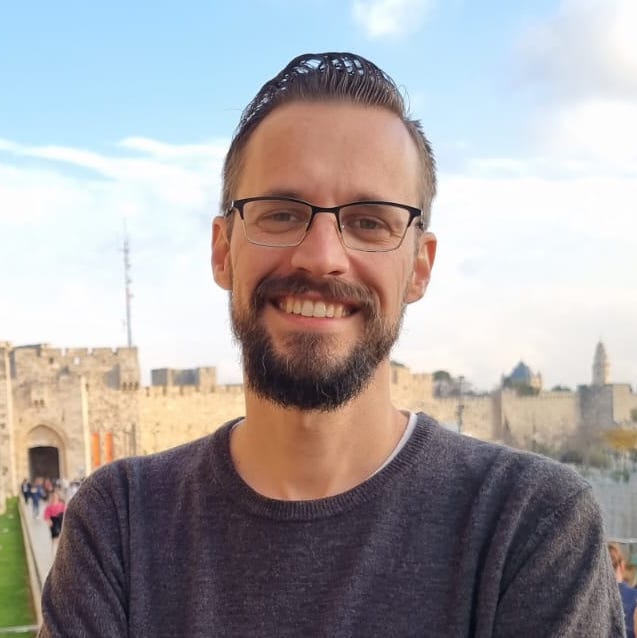From the Russian army to founding blue-white nations: The parallel journeys of Trumpeldor and Mannerheim

Imagine a cold morning during the Russo-Japanese War, somewhere near Port Arthur, where the Russian and Japanese armies clash fiercely. Two young officers, both marked by courage and ambition in the Imperial Russian Army, find themselves briefly thrown together amid the chaos. One is Carl Gustaf Emil Mannerheim, a cavalry officer destined to become Finland’s wartime leader and national father. The other is Yosef Trumpeldor, a passionate Zionist who has already suffered the loss of his left arm in battle, yet continues to fight with unmatched determination.
They exchange a few words in Russian, perhaps about the bitter winter, the fog of war, or their uncertain futures. They might have shared a cigarette, or just nodded in silent respect.
We can’t know if this encounter actually happened — but it’s not hard to imagine.
Both men were officers in the same army at the same time. Trumpeldor, born in 1880, lost his left arm in 1904 during the fierce siege of Port Arthur, yet he refused to let this stop him. In Japanese captivity he led a Zionist association called “Bnei Zion Captives in Japan“ with 120 members. When World War I broke out, he volunteered for the British Army and helped form the Zion Mule Corps, a Jewish unit that fought in Gallipoli. After the war, he devoted himself fully to Zionism, eventually dying a heroic death defending the Jewish settlement of Tel Hai in 1920. Mannerheim, born a few years earlier in 1867, also rose through the ranks of the Russian Imperial Army before returning to lead Finland through its fight for independence and later, its brutal wars against his former comrades in the army of what was now the Soviet Union.
Though their lives followed different paths, both became iconic nation-builders: Mannerheim shaping the Finnish nation-state with military skill and political savvy; Trumpeldor laying spiritual and ideological foundations for what would become the State of Israel.
Trumpeldor’s sacrifice at Tel Hai was pivotal. His death helped crystallize Jewish determination to hold the land — not only in spirit, but through the defense of strategic positions vital to the survival of future settlements. This determination shaped the contours of Israel’s borders decades later, and established the strategic “Galilee panhandle,” a finger of territory extending north from the Sea of Galilee between Lebanon and the (then) Syrian Golan Heights. That panhandle remains vital for Israel’s water security, keeping the sources of the Sea of Galilee under Israeli control. This act of devotion transformed a fragile frontier into a symbol of resilience.
Both men were instrumental in creating a “blue-white” nation. Their shared heritage as officers in the Russian Empire and their fierce patriotism for their emerging nations create a remarkable parallel.
But there is a stark contrast as well. Mannerheim’s Finland famously hosted Adolf Hitler as a guest for his 75th birthday in 1942, during the dark days of World War II, walking a complex line between survival and alliance. Trumpeldor, by contrast, embodied a Zionism rooted in self-sacrifice, dignity, and hope — values that stand in moral opposition to the Nazi ideology Finland briefly accommodated for strategic survival. However, despite the wartime alliance with Germany, Mannerheim is remembered for his quiet but firm refusal to adopt Nazi racial policies. He even extended holiday greetings to the Jewish community during the war — a subtle but powerful gesture of protection.
Trumpeldor’s one-armed figure became a symbol of Jewish courage and resilience, and the unyielding will to defend a future homeland, and his famous last words — “It is good to die for our country” — echo still in Israeli memory. Meanwhile, Mannerheim’s leadership helped Finland preserve its sovereignty against enormous odds, a testament to the power of determined statecraft.
Mannerheim’s legacy is paradoxical: a monarchist who helped preserve a republic, a military man who avoided total war, and a wartime leader who—despite Finland’s alliance with Nazi Germany—shielded his country’s Jews from the Holocaust. In one of history’s stranger twists, Jewish soldiers served openly in the Finnish army and even fought on the same front as German troops—defending their homeland while Hitler was exterminating Jews elsewhere in Europe. Yet even in Finland, moral compromises happened. In 1942, eight Jewish refugees were handed over to the Gestapo and executed. Mannerheim wasn’t directly involved, and he is remembered for resisting Nazi pressure to persecute Jews. Still, the episode stands as a dark contrast to the Zionism of Trumpeldor—who fought and died to ensure there would be one place on earth where no Jew would ever be handed over again.
Had Trumpeldor lived, many believe he could have become Israel’s version of Mannerheim: a military and spiritual leader helping to forge a modern nation with both strength and vision — alongside figures like Jabotinsky and Ben-Gurion. He and Jabotinsky were close collaborators, co-founding the Zion Mule Corps during World War I, and Jabotinsky later named the Beitar youth movement after Trumpeldor, enshrining him as a model of Jewish heroism and national pride. Both men were born in 1880, and had Trumpeldor lived to see 1948, he would have been 68 — the same age as Mannerheim when he stepped into Finland’s presidency. It’s not hard to imagine Trumpeldor, one-armed but unshaken, standing alongside the firebrand Jabotinsky at the rebirth of Israel — a blue-and-white nation forged by their shared ideals, military discipline, and enduring sacrifice.
Two men, born in the same empire, both war veterans and nation-builders, linked by fate, ideals, and the blue-white banners under which they marched — their stories remind us how individual sacrifice and leadership shape the destiny of nations.

Tuvia is a Jewish history nerd who lives in Jerusalem and believes in Jesus. He writes articles and stories about Jewish and Christian history. His website is www.tuviapollack.com













